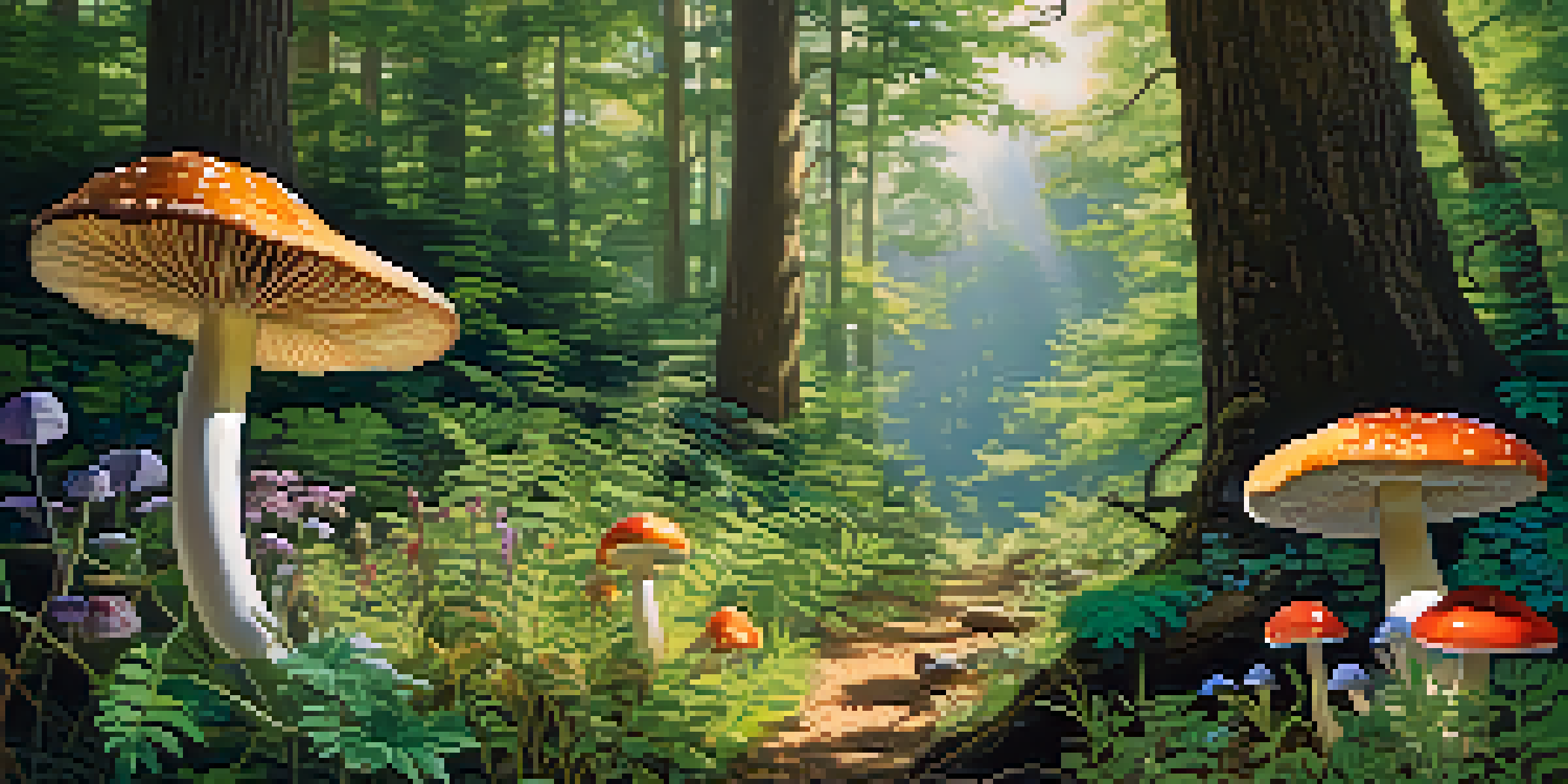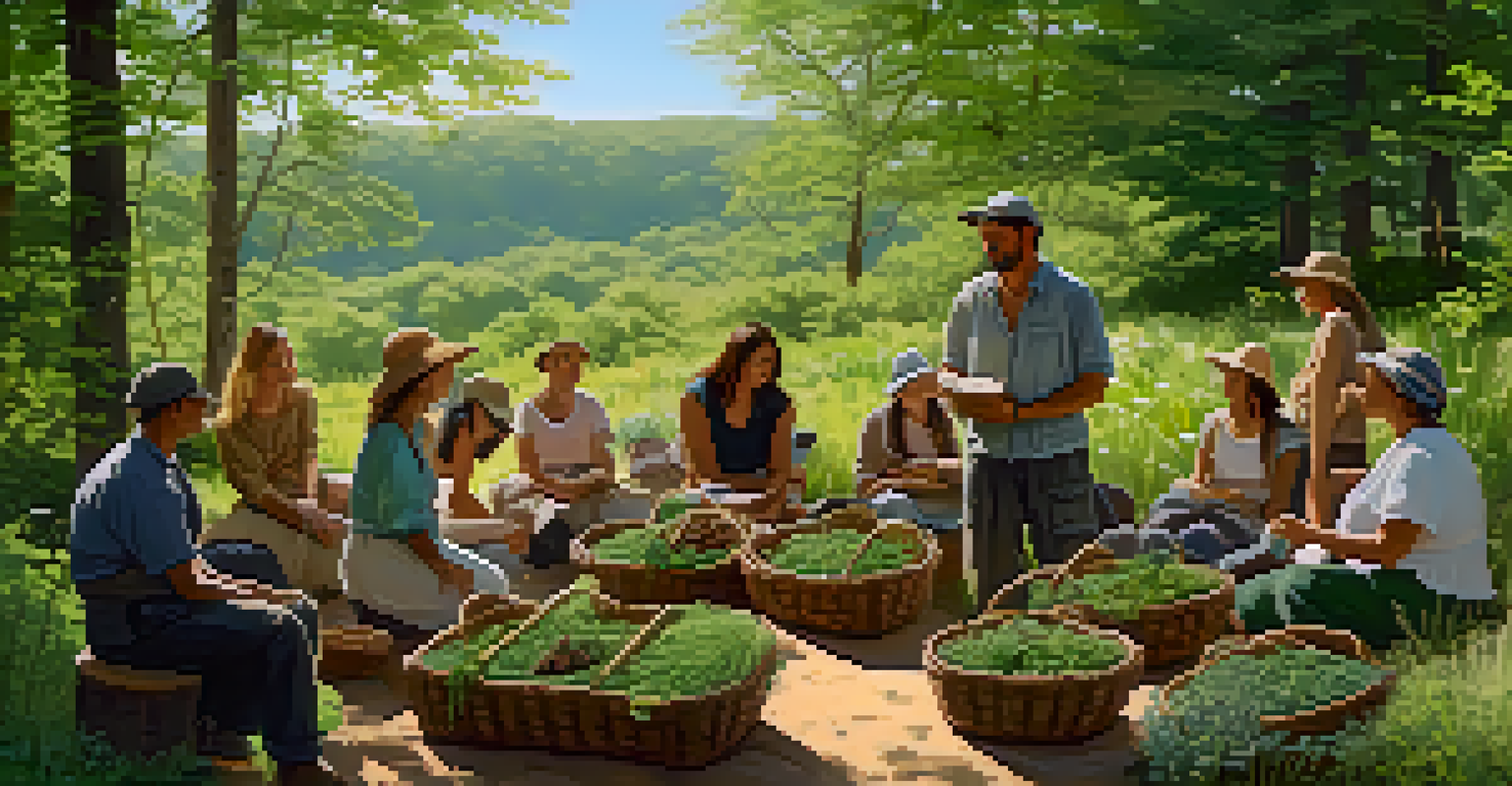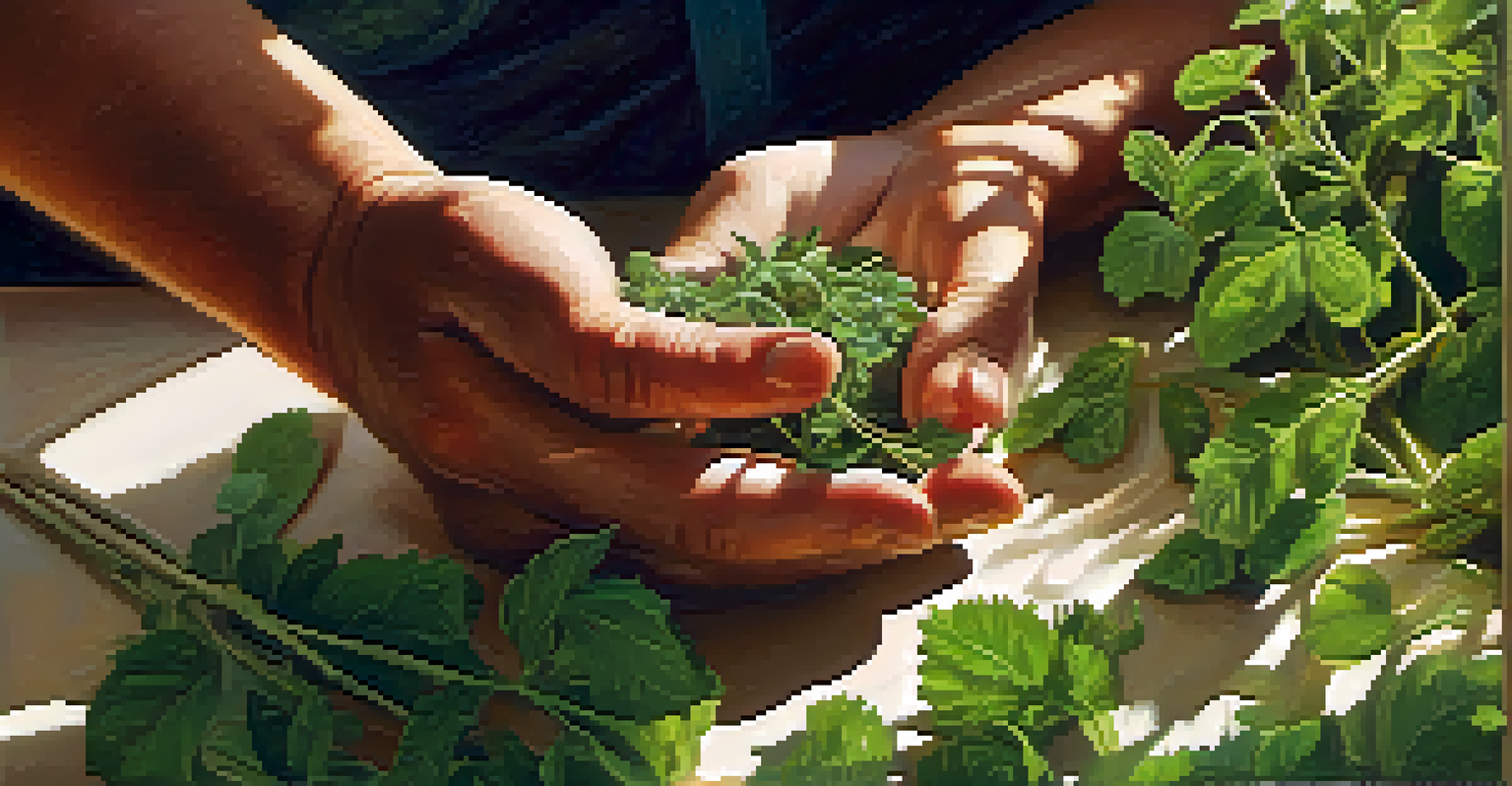Ethics of Wild Harvesting: Respecting Nature's Bounty

Understanding Wild Harvesting: What Is It?
Wild harvesting refers to the practice of gathering plants, mushrooms, and other natural resources from their native habitats. Unlike farming, which involves cultivation and control, wild harvesting relies on nature’s natural cycles. This practice can range from foraging for wild berries to collecting medicinal herbs. Understanding what wild harvesting entails is crucial for appreciating its ethical implications.
The greatest threat to our planet is the belief that someone else will save it.
The concept may seem straightforward, but it encompasses a variety of techniques and motivations. Some individuals harvest for personal consumption, while others may do so for commercial purposes. Regardless of the intention, wild harvesting can significantly impact the ecosystems involved, making it essential to approach the subject with care and respect.
As we delve deeper into the ethics of wild harvesting, it's vital to consider the balance between benefiting from nature and protecting it. This balance serves as the foundation for sustainable practices that honor the environment while meeting human needs.
The Importance of Sustainable Practices
Sustainability is key when it comes to wild harvesting. By ensuring that the resources we gather do not deplete the environment, we help maintain biodiversity and ecosystem health. For instance, taking only what you need and leaving enough for plants to regenerate is a simple yet effective sustainable practice. This not only benefits the environment but also supports future harvesting efforts.

Moreover, sustainable practices promote a respectful relationship with nature. They encourage individuals to learn about local ecosystems and understand the delicate balance that sustains them. When harvesters prioritize sustainability, they contribute to a culture that values preservation over exploitation.
Sustainability in Wild Harvesting
Practicing sustainability ensures that wild harvesting benefits ecosystems while allowing future generations to enjoy natural resources.
Incorporating sustainable approaches into wild harvesting is not just an ethical choice; it’s a practical one. Healthy ecosystems provide a wealth of resources for years to come, ensuring that future generations can enjoy nature’s bounty just as we do today.
Legal Regulations: Navigating the Framework
Understanding the legal landscape surrounding wild harvesting is essential for ethical practices. Many regions have specific regulations that dictate what can be harvested and how much. These laws are designed to protect endangered species and preserve natural habitats. Ignorance of these regulations can lead to overharvesting and ecological damage.
We do not inherit the earth from our ancestors; we borrow it from our children.
For example, certain plants may be protected due to their declining populations, making it illegal to harvest them. By familiarizing ourselves with local laws, we can ensure that our harvesting practices are not only ethical but also legal. This knowledge helps us navigate the often-complex relationship between human activity and environmental conservation.
In addition to following regulations, engaging with local communities can provide valuable insights into sustainable harvesting practices. Many indigenous cultures have long histories of responsible resource use, and their wisdom can guide us in our efforts to respect and protect nature.
Cultural Significance of Wild Harvesting
Wild harvesting is often intertwined with cultural traditions and practices. For many communities, gathering wild resources is not just a means of sustenance; it’s a way to connect with their heritage and environment. For instance, Indigenous peoples often have deep-rooted knowledge about the plants in their regions, including their medicinal properties and ecological roles.
This cultural significance highlights the need for respect and sensitivity when harvesting. It’s crucial to acknowledge the historical and spiritual connections that certain communities have with specific plants and resources. By honoring these relationships, we can foster a more inclusive approach to wild harvesting that benefits everyone involved.
Cultural Respect in Harvesting
Acknowledging the cultural significance of wild harvesting fosters respectful practices that honor the historical ties communities have with nature.
Furthermore, integrating cultural perspectives into our understanding of wild harvesting can lead to more sustainable practices. By learning from those who have long respected and utilized these resources, we can develop a more holistic approach that values both ecological integrity and cultural heritage.
The Role of Education in Ethical Harvesting
Education plays a pivotal role in promoting ethical wild harvesting practices. By educating ourselves about local ecosystems, we become more informed harvesters who respect the limits of nature. Workshops, courses, and community events can provide valuable insights into sustainable practices, species identification, and the importance of biodiversity.
Moreover, education fosters a sense of responsibility among harvesters. When individuals understand the impact of their actions, they are more likely to engage in practices that support ecological balance. This knowledge empowers people to make choices that are beneficial not only for themselves but also for the environment.
As we share knowledge within our communities, we can collectively work towards a future where wild harvesting is done responsibly and sustainably. A well-informed group of harvesters can significantly reduce the ecological footprint of wild harvesting activities.
Challenges and Threats to Wild Harvesting
Despite the many benefits of wild harvesting, several challenges threaten its sustainability. Overharvesting, habitat destruction, and climate change are significant issues that can lead to the decline of vital plant species. For instance, the increasing popularity of foraged foods can lead to intense pressure on specific resources, risking their availability for future generations.
Additionally, the loss of biodiversity due to urbanization and agricultural expansion can further complicate wild harvesting efforts. As native plants and habitats disappear, the options for sustainable harvesting diminish. This underscores the need for proactive measures to protect ecosystems and promote biodiversity in our environments.
Education for Ethical Practices
Education equips harvesters with the knowledge to engage in responsible practices that support ecological balance and biodiversity.
Addressing these challenges requires collaboration among harvesters, conservationists, and policymakers. By working together to create solutions, we can ensure that wild harvesting remains a viable and ethical practice in the face of mounting pressures.
Future Perspectives: A Harmonious Relationship with Nature
Looking ahead, the future of wild harvesting hinges on our ability to foster a harmonious relationship with nature. As awareness of sustainability grows, more individuals are embracing ethical harvesting practices. This shift indicates a collective move towards recognizing the importance of preserving the natural world while still benefiting from its resources.
Innovative practices, such as community foraging groups and sustainable harvesting certifications, are emerging to support this ethical approach. These initiatives not only educate participants but also encourage a sense of stewardship towards the environment. By participating in such programs, we can contribute to a culture that values the bounty of nature while prioritizing its protection.

Ultimately, the goal is to create a sustainable future where humans and nature coexist in balance. By respecting nature’s bounty through ethical practices, we can ensure that the beauty and resources of our world remain vibrant and accessible for generations to come.